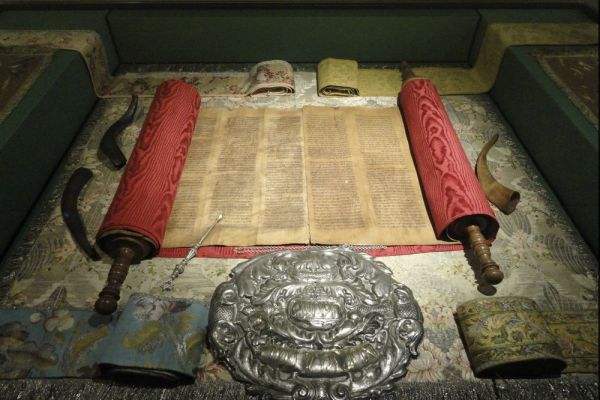(Jn 12:20-33)
John 12:20 Among those who had gone up to worship at the feast were also some Greeks.
John 12:21 These approached Philip, who was from Bethsaida of Galilee, and asked him, "Lord, we want to see Jesus."
John 12:22 Philip went and told Andrew, and then Andrew and Philip went and told Jesus.
John 12:32 When I am lifted up from the earth, I will draw all people to myself.
V. 20 introduces characters belonging to the world of the pagans, the Greeks, whose presence was widespread in Palestine, following the conquests of Alexander the Great and the colonisation it underwent over time, to which the two Books of Maccabees bear witness. The very names of the two disciples, Philip and Andrew, to whom the Greeks are addressed, bear Greek names, showing how thoroughly Greek culture had penetrated throughout Palestine. They were from Bethsaida located about ten kilometres from the border of the Decapolis and perhaps therefore knew Greek. The same inscription placed by Pilate on the cross of Jesus was also reproduced in Greek. The Jewish historian Flavius Josephus wrote his works in Greek, and the New Testament itself was written in Greek, due to the widespread use of this language. The church, too, spoke and wrote in Greek in the first four centuries. It was only towards the end of the 4th century, under the impulse of Pope Damasus I, that the Western Church introduced Latin into the liturgy and translated the entire Bible into Latin, a work that Pope Damasus himself commissioned from St Jerome.
But who were these Greeks? To what category of people did they belong? We know that following the conquests of Alexander the Great, the Greek language and culture spread everywhere, giving rise to the great phenomenon of Hellenism, i.e. the assimilation of the conquered populations to Greek customs, way of life, culture and language. Within the Bible, the term "Hellenist" (Ellēnistēs) designates the Jews of the diaspora of Greek language and culture, religiously less rigid in the practice of the Torah than their co-religionists in Palestine and more open to the pagan world with which they lived. But here, in Jn 12:20, the Greek term for this category of people is "Ellenēs" (Greeks). In the New Testament, the term is broadly extended to the pagan world and generally indicates the non-Jew. Given, however, the historical accuracy with which John recounts his Gospel, these Greeks must really have been such. These Greeks, therefore, belonging to the pagan world, 'had gone up (to Jerusalem) to worship at the feast'. They therefore, though pagans, participated in the Jewish cult. This is a category of people who were defined by the Jews as the 'God-fearers'.
These, pagans by birth, looked favourably on the Jewish community for their piety, their monotheistic worship, their moral conduct and strict observance of the Torah. These fearful ones, therefore, are referred to "among those who had ascended". They are therefore associated with the Jews who ascended to Jerusalem, like the pilgrims who went up to Jerusalem on feast days to worship. The purpose of this ascent to Jerusalem by these Greeks is, literally, "to worship" (hina proskynēsōsin), that is, to acknowledge Yahweh as the true and only God.
They represent the universality of salvation, which will find its apex in v. 32: "I, when I am lifted up from the earth, will draw all to myself".
Vv. 21-22 take up this theme of the universality of salvation and worship, which flows from the cross of Jesus, making it an ecclesiological theme, that is, of mediation. It is thus that the Greeks turn to Philip and the latter puts the request to Andrew; and the disciples, finally, together convey this desire to Jesus, as if to say that now Jesus can only be met through ecclesial mediation and within the church.
What the Greeks in fact desire is "to see Jesus", a seeing that in Greek is expressed with the verb "horáō", the verb of fulfilled faith, it is the seeing of believing. Their faith is sustained by desire that becomes will: "we want". A faith, therefore, that is already rooted in them and that waits to be fully accomplished in the encounter with Jesus.
Significant here is the choice of the two disciples to whom the Greeks turn: Philip and Andrew. What the two disciples have in common is that they met Jesus first, announced him to their other companions and brought them to Jesus. It is precisely this intermediary capacity of theirs that makes them suitable to represent the missionary scheme of the Church, which welcomes the Risen One into itself and announces him to the whole world.
The episode is in a way prophetic, in the sense that it prepares the time of the Church. By now, Jesus' time is coming to an end and those who want to adhere to him will have to pass through his disciples. From then on, Jesus will no longer work directly, but only in a mediated way: the Church is the new meeting place between God and man.
Argentino Quintavalle, author of the books
- Revelation - exegetical commentary
- The Apostle Paul and the Judaizers - Law or Gospel?
Jesus Christ true God and true Man in the Trinitarian mystery
The prophetic discourse of Jesus (Matthew 24-25)
All generations will call me blessed
(Buyable on Amazo)




